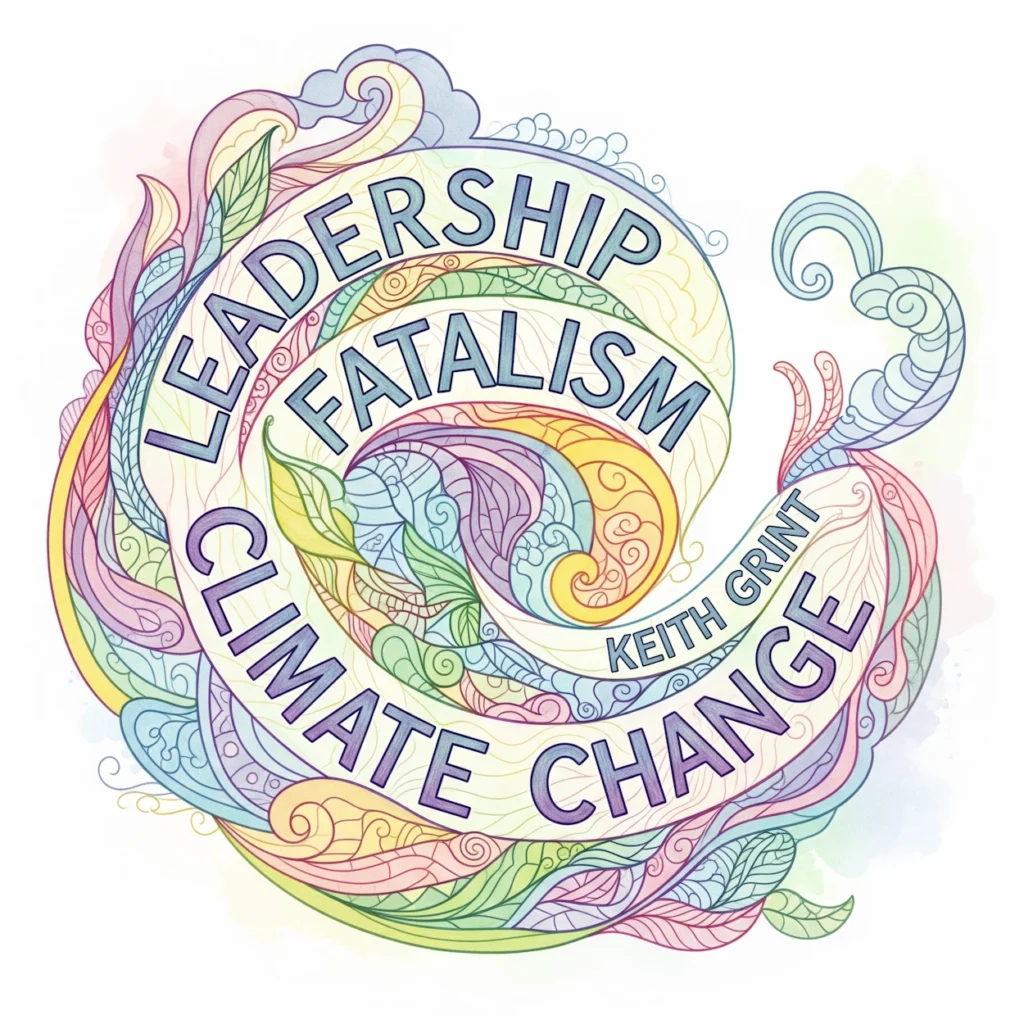In this insightful video, ‘Leadership, Fatalism and Climate Change’, renowned academic Keith Grint tackles a critical global challenge. He asks a powerful question. Why, despite decades of data and warnings, have we seen so little progress in halting climate change? He explores the complex psychological and social factors behind our collective inaction.
Grint goes beyond the usual discussions of policy failures or corporate greed. He examines how our deep-seated fatalism prevents us from taking effective action. He also offers a new perspective on how we might overcome this. This video provides a fresh approach to a difficult topic. It is an essential watch for anyone interested in real solutions.
Watch Leadership, Fatalism and Climate Change
Video Production
The Leadership Fatalism and Climate Change video was created using Keith Grint’s voice from an existing video which was his Wicked Problems video at Belfast’s Titanic centre several years ago. Keith Grint wrote the presentation, however I used AI to change the script and lip-sync the video. The quality of the video production could be improved but it is not bad. I think it may have been the starting video that lacked visual quality in parts. Contact today if you would like a video like this created for you.
Transcript – Leadership Fatalism and Climate Change
We have data on the first cherry blossoms in Kyoto since around 800 CE, and for a thousand years there was little variation. But amongst the first warnings that we were heading into dangerous climate territory. Was a 1912 New Zealand newspaper article headline ‘Coal consumption affecting climate.’ Concerns began accelerating in the 1970s with the 1972 Club of Rome report ‘Limits to Growth’ and the world’s first climate conference in 1979. We have had annual conferences and many reports on the threat for nearly fifty years now, but the data suggests that climate change remains unaffected by any of these, and we are now heading into dangerous and uncharted territory. So, should we just accept our fate and give up?
Why has nothing happened to impede climate change?
Well partly because investment in fossil fuels has risen since the pandemic in 2020, aided, no doubt, by the increases in fossil fuel subsidies provided by various governments to the tune of $967bn in 2022, an increase of 475% since 2010. Some of these Wicked Problems linked to so-called Progress Traps: human ingenuity appears to solve the initial problem but inadvertently creates another Wicked Problem. For example, oil solves transport, manufacturing and heating problems but destabilizes the climate, and medicine enables humans to live longer but destabilizes health systems. But it isn’t just the fossil fuel companies or governments that are to blame: what about citizens and subjects?
We know that few of us are willing to change our lifestyle radically to save the planet. For example, a recent poll of 10 countries including the US, UK, France and Germany in 2021, found that people prioritise measures that are already habits, like recycling their rubbish, but seldom undertook actions that were much more significant, like reducing meat consumption, flying less or driving less or having fewer children. Yet ironically most argued that they would accept stricter measures if necessary but what they were already doing was more important than the radical changes actually required. And while there were significant differences across countries, the country with the greatest gap between how people viewed their own efforts versus those of their government, was highest in the UK and lowest in New Zealand and Singapore.
So, what can we do about this? Let’s think about space and time.
The old joke about looking for lost keys under the street light because that’s where the light is best is the equivalent of using data – empirical facts – to persuade people to change their minds when it should be obvious that people rarely change their minds, are seldom persuade by data, and much more open to persuasive narratives, bolstered by loyalty to the leader or the political party. It is within this space that social media operates and Brandolini’s Law kicks in.
This suggests that the amount of energy requite to refute bullshit is much greater than the energy required to construct the original bullshit. So, when someone posts something you know to be a lie on social media, it might have taken them five minutes to make it up and send it – but it will take you hours to search all the scientific data required to prove the bullshit wrong – and by then the bullshit has already done its work and the very repetition of the lie is enough to enhance its credibility.
Worse, the number of newspaper editorials denying or undermining concerns for climate change has increased since 2016,
making it even harder to persuade people to take the problem seriously. And when we consider that the top five oil companies spend over $200 million annually on climate lobbying, it should be obvious just how much of an uphill struggle this is. Nor do we have time to follow Max Planck who suggested that so difficult was it to persuade sceptics of a new scientific paradigm that we would just have to wait for the sceptics to die off – ‘one funeral at a time’ as he put it.
So, should we abandon the provision of research data showing how fast we are heading towards environmental disaster, and starting hoarding food and water?
Or are we looking in the wrong place for answers? We know, for example, that despite all the research on the difficulty of getting people to change their minds. It is possible – providing people can meet face to face, there is time given to reflect on the exchange of views. And the threat to status – especially public humiliation by being proved wrong – are significantly reduced. Even more intriguing, there is research that suggests two important counter-actions.
First, we are social animals, driven by social contagions as much as logic. We know, for example, that it’s much harder to diet when surrounded by people who are obese or overweight. And it’s easier to lose weight if in a group activity focused on losing weight. And there is research to suggest that most of us are willing to do more for the climate if – and only if – the leaders and elites show some leadership and take the first steps. Thus, a survey in 2024 by Westlake et al noted that 86% were willing to take more radical steps if politicians, business leaders and celebrities made the first move, after all, they have the worst carbon footprints and can bear the costs easiest.
Second, we need to focus our efforts on those most likely to be open to new knowledge
and most likely to persuade others to change their mind on the basis of this new information. For example, Lawson et al in 2019 monitored the introduction of climate change issues to schools in North Carolina and established two important points: first, that children were open to changing their minds given the available information, and second, and perhaps more importantly, it was these children that persuaded their sceptical parents to change their minds too. Indeed, the greatest transformation came when the children involved were daughters and the parents involved were fathers from a conservative background with no interest in climate change.
The second element to consider in how we might make progress here is time.
In Nevil Shute’s 1957 apocalyptic novel On the Beach, the population of Melbourne Australia are amongst the last survivors of a nuclear war that started in 1963, and the fall out is now heading their way. The survivors don’t build shelters or stockpile food and water but avail themselves of the free suicide pills given out by the government or spend their last few days undertaking outrageously dangerous car races or simply partying. But this extreme – and extremely pessimistic – example framed by considering time as unilinear: there will be a point in the future when things will change.
However, we know from research into domestic violence, for example, that how survivors and victims configure time makes a radical difference to their response.
Thus, many survivors talk of multiple assaults in a linear frame that speaks of their willingness to put up with violence until a future decision time. ‘When he finishes his anger management course’ or ‘after my birthday’ etc. Yet the police know that these cases are more often situated by circular time – the violence will NEVER stop until the perpetrator is stopped.
So, is that light at the end of the tunnel the end of the darkness or merely a train(wreck) racing towards us?
Albert Camus, the French-Algerian philosopher and novelist, wrote about Sisyphus. The ancient Greek king who cheats death and condemned by Zeus to push a boulder up hill. Knowing that when he reaches the top it will fall back to the bottom and Sisyphus must push it back up – forever. Camus likens this to the absurdities of life but notes that we must imagine Sisyphus smiling at his predicament because to do otherwise is to give up and allow the gods to win. Perhaps we should do the same: never give up despite the odds because to do so is both to betray our children and all those who degrade the planet to win. Or as he put it in his essay ‘Return to Tipasa’, ‘In the middle of winter I at last discovered that there was within me an invincible summer.’







Leave a Reply